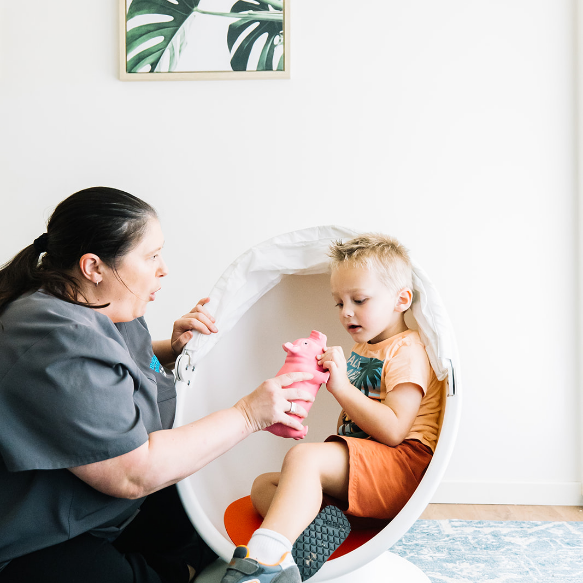Communication Assessment (Speech Pathology)
A communication assessment explore’s the child’s current abilities in both their understanding of language (receptive language) and use of language (expressive language) to understand how they are developing compared to same age peers.
Identify a speech and/or language disorder.
Language is a complex system with interrelated parts in form, content and use, it is essential to identify if a language disorder exists and to understand it in order to inform a cohesive approach to treatment.
Understand aspects of communication.
Assist children in being able to speak clearly, process speech sounds, understand others and have their needs met.
Personalised Recommendations.
A report is provided outlining recommendations to support and expand speech and communication development.

Speech, language and communication skills are crucial to young children’s overall development. Assessment is a process of learning about a persons communication strengths and needs to inform the need for therapeutic or assistive technology supports. This process always involves the person with a suspected communication need, their primary carer and significant others.
Who it's for...
Different types of communication assessment are undertaken depending upon the age of a child and their stage of development. Assessments can be completed for babies, toddlers, preschoolers, school aged children and adults.
What to Expect
For babies and toddlers who are communicating without words, or using 1-2 words together, the assessment may use standardised testing along with observations of your baby playing and interacting with you to identify how your child may communicate in their environment.
For preschoolers, or those communicating in phrases and sentences, standardised assessments are used along with observations of your preschooler interacting with both you and the therapist. This assessment is about identifying verbal and non-verbal communication skills, social skills and school readiness skills.
For school aged children and teens, the assessment includes standardised, criterion referenced and observational assessment of written, expressive and receptive language, social use of language, use of speech sounds and literacy.
For young adults and adults who are communicating non-verbally, the assessment will occur through observations of everyday routines. This assessment will consider form, function and social use of language in an attempt to identify a combination of alternative and augmentative communication supports.
During an assessment you will be asked some questions about your child’s development and interact with your child in the way you do at home. Your therapist will observe you and your child, listen to you and collect additional information through interaction and observation.
After the Assessment
On completion of the assessment, we will provide you with a written report, discuss the outcomes and offer recommendations.
Part of an individualised therapy program
Communication skills are essential to life. Your speech pathologist will collaborate with caregivers to provide strategies and information on supporting your child’s communication development and where necessary, individual speech pathology sessions will be offered.